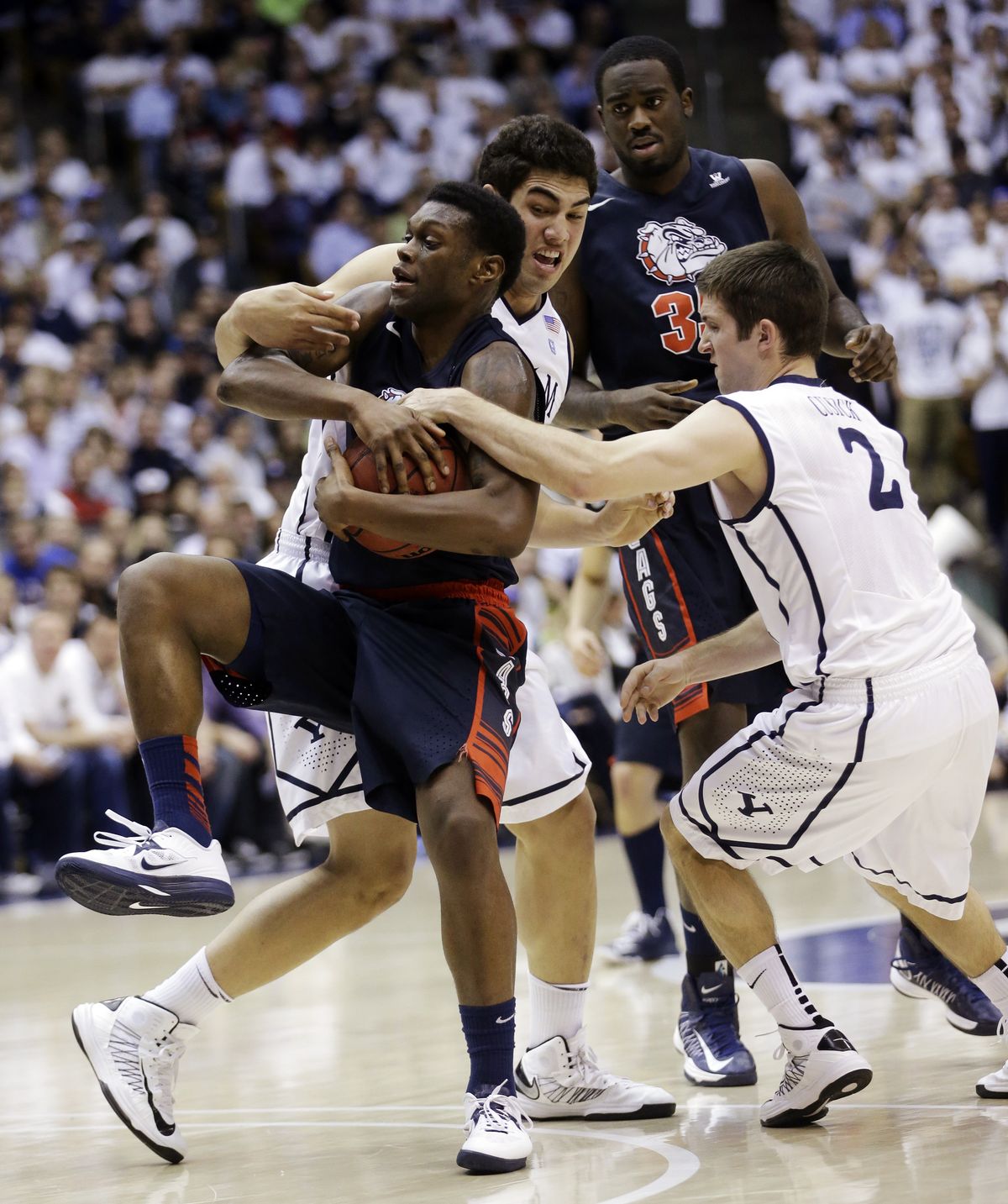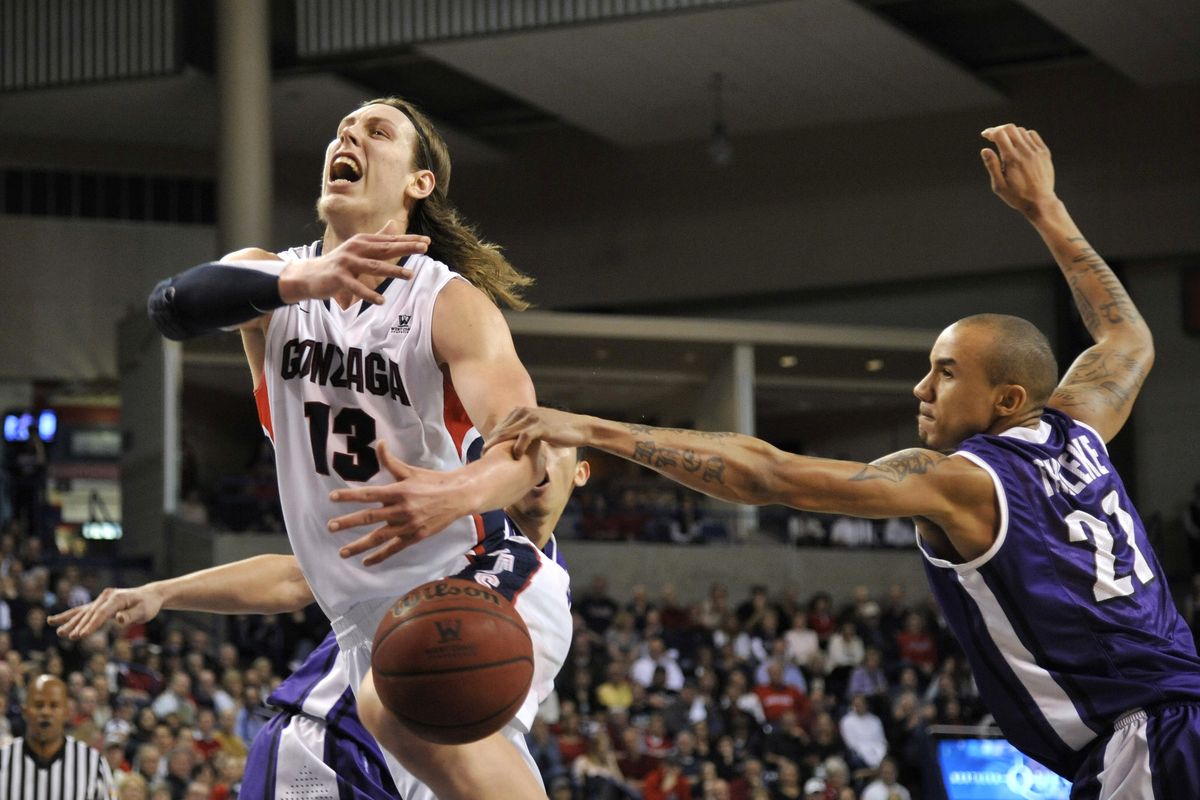Bulldogs used to getting physical
GU’s Gary Bell Jr. is fouled during the win over BYU. (Associated Press)
“Olynyk the catch, one dribble. He is just hammered by Kaufusi, hammered, and the Zags are furious. Man, was that a hard foul. Olynyk just got destroyed there. … He (Kaufusi) plays football, but in this sport you can’t do that.” – ESPN broadcaster Dave Flemming
It’s happened to virtually every Gonzaga standout player through the years. They become the focus of opponents’ scouting reports, draw the most attention, an occasional gimmick defense and usually end up with the most bruises.
Head coach Mark Few said it essentially comes with the territory for talented players such as junior forward Kelly Olynyk. Assistant coach Tommy Lloyd noted that foes are going to “throw adversity at you and it comes in different forms. It might come in physical play, it might come in flopping and you have to be mentally prepared for that.”
The only thing that would have prepared Olynyk for the blow administered by BYU’s 6-foot-7, 260-pound Bronson Kaufusi in the second half last Thursday would have been a helmet and shoulder pads. Kaufusi, who plays defensive end on BYU’s football team, was called for a Flagrant 1 foul, resulting in two free throws for Olynyk and GU retaining possession.
Forward Sam Dower, Olynyk’s roommate and one of his best friends, exchanged words with Kaufusi. Olynyk, who was helped to his feet by BYU’s Nate Austin, never changed his expression. Olynyk made 1 of 2 free throws and took a seat on the bench for a brief rest with GU leading by eight with 11 minutes remaining.
“Teams have definitely been trying to muck things up, frustrate us, hit us, bump us, get us off our game,” said Olynyk, who was named WCC player of the year on Tuesday. “The WCC definitely isn’t as soft as people think.”
And the Zags certainly aren’t soft. With Olynyk, who averages 17.7 points, senior forward Elias Harris at 14.6 points and Sam Dower and Przemek Karnowski combining for 13, the Bulldogs make no secret of their inside-out approach.
“BYU was a really physical game,” Harris said. “A lot of hitting and not as many calls, which is fine because both sides were hitting hard.”
Gonzaga is used to the contact. Last week at practice, Harris needed seven stitches to close a cut on his nose after a collision with a teammate’s elbow. A few minutes later Guy Landry Edi took a blow to the chin and left the court. The guards aren’t immune from the physical play. Loyola Marymount and San Francisco tried recently to elevate the pressure on GU’s backcourt.
“They had a great example in (ex-Zag) Rob (Sacre),” Lloyd said. “Rob was engaging and hitting on every single possession, the best we’ve ever had at that. For Kelly and ‘E’ to go against that every day, it helps prepare them to feel like it’s normal.”
Games often get more physical late in the regular season, particularly in rematch conference games and in conference tournaments when teams are fighting to extend their seasons.
“It’s March and it doesn’t seem to be as many fouls called,” Lloyd said, “but we feel we’re built to play for that.”
Few said WCC games “have been more physical than our non-conference games, which wasn’t the case in the past.”
“A lot of these games have been pretty darn physical down the stretch,” he said. “It seems like the WCC use to take some real heat for that, but our league kind of looks like the Big East, Big Ten, especially inside.”
Poise and self control are the keys to handling intense, competitive moments inside a packed arena, Few said.
“You have to be above it all, and Kelly’s done a nice job with that,” he said.
Olynyk is accustomed to the added attention and physical play.
“You kind of a need to stand up for yourself, but sometimes you need to let your game talk for you,” Olynyk said. “You have to keep a level head and stay smart because whatever you do can hurt you and your team. After the game, (Kaufusi) shook my hand and said, ‘Great job.’ I don’t try to take any of that stuff personally. I take it as a note of pride, that I’m a key factor.”

